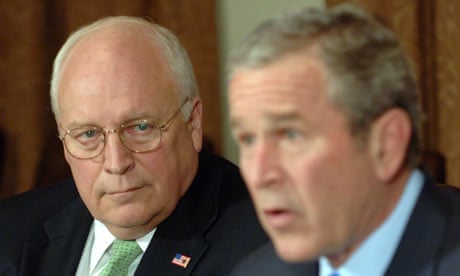Former president George W Bush says in his new memoir that he considered running for re-election in 2004 without Dick Cheney as his vice-presidential candidate. After much thought, however, he decided to keep Cheney on the ticket.
Bush said he wanted to put an end to assertions by critics that Cheney was the real decision-maker and to "demonstrate that I was in charge".
He writes that he spent weeks exploring the possibility of replacing Cheney with Tennessee senator Bill Frist, who was Senate majority leader. But he says he valued the qualities Cheney brought to their partnership and finally decided to stick with his vice-president, who agreed to run again.
The former president makes the revelation in Decision Points, which is due in bookstores on 9 November from Crown Publishers. The New York Times obtained an advance copy and reported on the book on its website on last night.
The book is not a conventional memoir, but rather a reflection by Bush on important decisions and moments in his life, including the 9/11 terrorist attacks and the war in Iraq. But it is traditional in the sense that Bush defends his presidency, including his decisions to lead a multinational coalition into war in Iraq and to authorise the use of harsh interrogation techniques on captured terrorist suspects.
Bush also expresses regret for his sluggish response to Hurricane Katrina in 2005, for agreeing to reduce troop levels in Iraq after the initial invasion in 2003 and for nominating his friend, attorney Harriet Miers, to the supreme court.
He writes about having "a sickening feeling" upon learning there were no weapons of mass destruction in Iraq and says "cutting troop levels too quickly was the most important failure of execution in the war".
Bush also recounts the pressure he felt from Cheney to pardon I Lewis "Scooter" Libby, Cheney's former chief of staff. Libby was convicted of lying about his role in the case of the leaked identity of a CIA operative Valerie Plame.
Of Cheney, Bush said that while his vice-president had helped with important parts of the Republican base, he had become a magnet for criticism from the media and the political left. "He was seen as dark and heartless, the Darth Vader of the administration," Bush writes.
He stuck with Cheney. "I hadn't picked him to be a political asset; I had chosen him to help me do the job. That was exactly what he had done," Bush said.
When the CIA sought permission to subject professed 9/11 mastermind Khalid Sheikh Mohammed to waterboarding, Bush said his response was, "Damn right." He added that the interrogations saved lives.
The book makes clear that Cheney nudged Bush toward war.
Bush writes that Cheney "had gotten out in front of my position" with an August 2002 speech dismissing the prospect of further inspections and says he ordered Condoleezza Rice, his national security adviser, to rein him in.
Cheney also disagreed with Bush's decision to fire defence secretary Donald H Rumsfeld after the 2006 midterm elections, when the Iraq war was going badly. Cheney also pushed for a pardon for Libby. Bush already had commuted Libby's sentence.
After he decided against a pardon, Cheney lashed out at Bush in private, accusing the president of leaving "a soldier on the battlefield."
"The comment stung," Bush said. "In eight years, I had never seen Dick like this, or even close to it." He said worried their friendship was fractured, but that it eventually survived the dispute.
